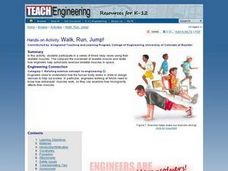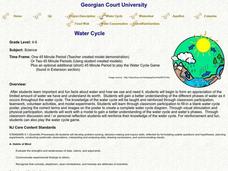Curated OER
Outdoor Classroom's for the '90s Student
Students relish in experiencing an outdoor classroom. Students sign a contract stating that they will follow the rules of the outdoor classroom. Students help to keep the outdoor classroom clean and up to date with all the needed...
Curated OER
Web of Life - Role-Playing
Students role-play how organisms adapt to their environment. They play 20 questions with plant and animal habitats. They create a web of life to demonstrate how each plant and animal relies on the other for survival.
Curated OER
Reduce, Reuse, Recycle
Learners participate in a recycling campaign. In this recycling instructional activity, students create an Earth Day display for a local store. Learners design a mural as a reminder to people of ways to reduce, reuse and recycle.
Curated OER
Your Amazing Body
Young scholars examine the different body systems and how they are interdependent on each other. In this body systems lesson plan students draw the body and its parts.
Curated OER
Measuring Animal Sizes (and Relative Sizes in our Animal Environment)
Students discover the actual size and weight of many insects and animals. For this biology lesson, students investigate animals and insects to determine their actual weight and size. In groups, students create an animal or insect of...
Curated OER
Fisheries Management in the Open Ocean
Students explore biology by researching fishing equipment. For this oceanography lesson, students discuss the impact of human technology on the fish population. Students utilize marbles as a visual aide and complete fish population...
Curated OER
The Nature of Chemical Change: Acting Out an Example
Students identify the signs that a chemical reaction took place. In this chemistry lesson, students role play the movement of different molecules of matter. They classify matter according to their properties.
Curated OER
TE Activity: Hot or Not
Students examine how the human immune system responds to germs and explain what a fever is. They design a thermometer in order to further explore temperature before completing a temperature conversion worksheet. They detail the work of...
Curated OER
Walk, Run, Jump!
Students participate in a series of timed relay races using their skeletal muscles. They compare the movement of skeletal muscle and relate how engineers help astronauts exercise skeletal muscles in space. They list the three types of...
Curated OER
Let's Rock
Students investigate the property of rocks and how to distinguish among the different types. They explore the hardness of rocks and perform streak tests to determine mineral color. They classify rocks according to their properties.
Curated OER
What's The Matter: A Sinker or Floater?
Young scholars conduct an experiment. In this water lesson, students watch the lesson "Float and Sink" on an interactive website. Young scholars learn how to test items in water and then work in groups to test their items. Students...
Alabama Learning Exchange
The Birth of Rock(s) - Identifying Rock Types
Young scientists investigate types of rocks in this instructional activity. They collaborate to examine groups of rocks, make written descriptions of them, and use websites to help them identify the types of rocks they are.
Curated OER
Food Webs in the Barnegat Bay
Students investigate the food webs in the Barnegat Bay. In this organisms activity, students use a graphic organizer to illustrate the types of consumers in the bay. Students use reference books to continue to research the animals found...
Curated OER
Crystal Growing
Young scholars explore the different phases of a crystal. In this mineral instructional activity students grow their own sugar crystals using a sugar recipe.
Curated OER
The Nature of Chemical Change: Acting Out An Example
Young scholars illustrate the molecular nature of matter and show that chemical change involves alteration of molecules.
Curated OER
How Does Your Garden Grow?
Students construct and maintain a school garden. In this gardening lesson plan, students plan the construction of the garden by writing letters to local businesses asking for supplies and materials; students build the garden using their...
Alabama Learning Exchange
Inner and Outer Planets
Students explore the solar system. In this planets lesson, students learn about the other planets in the solar system. They watch a video clip from National Geographic on the solar system, compare and contrast the planets and create a...
Curated OER
Water Cycle
Students explore the water cycle. In this water cycle lesson, students examine water as a resource as they create a water cycle poster and create a water cycle model. Water cycle game instructions are included as well.
Curated OER
Aquifers and Groundwater
Young scholars understand the purpose of an aquifer. In this aquifer and groundwater lesson plan, students build a model aquifer find its relationship to water usage. Young scholars record observations as they build the layers of the...
Curated OER
Traveling the Planets!
Fourth graders research the planets and create brochures to share their information. In this planets lesson, 4th graders navigate the Internet to gather information for a brochure about an imaginary trip to their planet. Students...
Curated OER
What's the Matter? (Experiments)
Students observe a scientific discrepant event, and are then challenged to create experiments to solve the dilemma.
Curated OER
Habitats of the World
Students discover that the Earth supports many different animal habitats. For this habitat lesson students research different habitats of the world. Students show how the animals in their habitat are adapted.
Curated OER
'O'opu Life Cycle
Students investigate the life cycle of the 'o'opu also known as Hawaiian gobies. In this amphidromous living lesson, students discuss the reproductive cycle, create props and an obstacle course to demonstrate the importance of the...
Curated OER
Skin and Sports
The topic is protecting our own protective covering: the skin. In particular, the information deals with sweating as a means of temperature regulation and the need to wear clothing appropriate for allowing the process to occur. Learners...

























